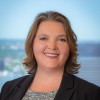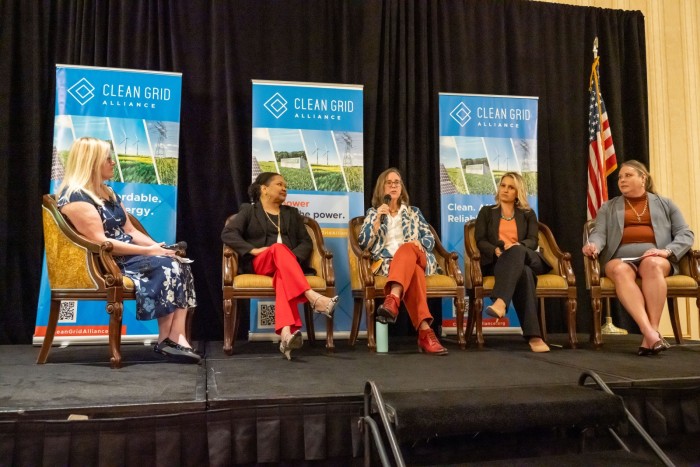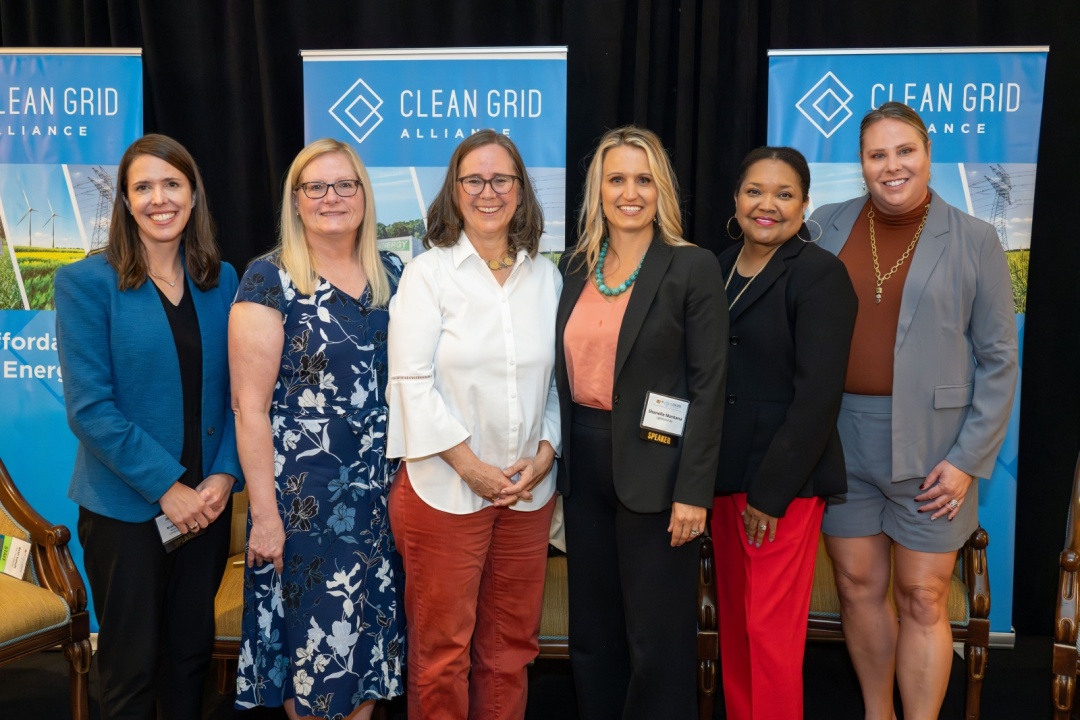Influential Women Leaders Headline CGA Benefit Breakfast
 | Kelley Welf, Communications Director |
 | Molly Vagle, Communications Associate, Siting |
 | Alex Thompson, Communications Associate |

 | Kelley Welf, Communications Director |
 | Molly Vagle, Communications Associate, Siting |
 | Alex Thompson, Communications Associate |
On Friday, September 29, CGA held our "Start Your Day With CGA" Breakfast Event featuring Influential Women Leaders including: Katie Sieben, Chair of the Minnesota Public Utilities Commission, who gave opening remarks, and a panel discussion including Sarah Beth Aubrey, CEO of In-Climate; Sarah Christiansen, Program Director of Midwest Climate & Energy for the McKnight Foundation; Shanelle Montana, Vice President of Development for Lightsource bp; and Kimberly Randolph, Vice President of Conceptual Design & Planning for Xcel Energy. This was a chance for the clean energy industry to enjoy a delicious breakfast, network with friends and colleagues, and hear from forward-thinking women leaders in the energy industry and beyond!
Suzanne Murphy of Xcel Energy posted on social media that Katie Sieben's opening remarks were "refreshingly candid," on what she has experienced as a woman in the many roles she has served. She talked with great depth on "both the challenges of being taken seriously as a woman in the energy industry, and the challenges facing the clean energy space in an era of hyper-polarization." She noted how important transmission build out is, and will continue to be, as we make the transition to clean energy.
"I'm excited and kind of nervous about the deadlines ahead. One reason ... is that we have significant transmission constraints. These constraints are limiting the output of existing facilities, stopping the construction of new facilities, and imperiling the reliability of our grid," said Katie Sieben.
"We can't overbuild the system at ratepayer expense," she continued. "The concern is how we are behind on this buildout and I'm fully committed to looking in the mirror and understand that in some cases the PUC contributes to unnecessary delay, and we let the process get in the way of progress." She asked for people to tell them what improvements are needed. "I know we need to do more faster, and I want to help see that happen."
"It's hard to be a woman in elected office," Sieben said, after she encouraged the audience to see the "Barbie" movie because the overarching message on the difficulty of being a female leader is "spot-on." Sieben spoke about women in leadership and having the overwhelming support from family, but despite their hard work women feel they can't bring their full selves to work because they are perceived to be less committed to the work if they are mothers.
Subscribe to our newsletter for the latest on energy & our work
She shared stories about having all three of her children while serving in the Senate. She included the story of leaving her newborn son in the hospital nursery so she could go to the Capitol to take a vote because she felt she needed to show her caucus, colleagues and constituents that she could do it. She explained that it's exhausting to try to prove yourself to others all the time and it's discouraging to feel disrespected and that your opinions aren't wanted, and are told to be quiet. "It's great to have conversations like this ... in a supportive environment where women's voices are heard, our ideas are valued and our leadership is acknowledged in the energy sector. I know there is a lot of work for us all to do, and I appreciate Clean Grid's attention and elevation of this issue very much."
During the panel discussion, Beth Soholt asked the panelists to reflect on the issues that arise with the transition to clean energy and what inspires them as women leaders. Kim Randolph explained that one of the biggest issues that arises with the clean energy transition is the size of the change, which is unprecedented, and the fast rate of change. Historically, we had one-way energy flow, but now we have two-way flow, she explained. Everything that worked before (policy, technology, planning) has to change with the transition to clean energy, and we have to plan it out and work together with all industries, stakeholders, and players involved. Grid growth is happening on a large scale, at a fast pace, and it's happening everywhere, she stated. Fortunately, she said, Xcel Energy realized that they cannot plan each system in silos.
“Long range planning is not about future decisions, it is about the future of present decisions. If you want to go fast, go alone. If you want to go far, go together.
- Kimberly Randolph
Sarah Christianson said, "The biggest challenge we have right now is around capital. We just passed the most transformative set of policies of any country in the world. The funders are wondering how we're going to do what we need to do in the U.S., and particularly in the Midwest." She added that the biggest challenge is finding where the gaps are and the ways to support the communities and towns that are scrambling to figure out how to access the capital. At McKnight, the largest foundation in the country to commit to Net Zero, they talk about how to make that money matter.
She talked about having to build out physical infrastructure but also the social infrastructure that is capable of helping people access the resources to make the clean energy transition happen. We first need to bridge the capital gap and work together with intentionality to fix the bottlenecks and map out the processes at the local level.
Shanelle Montana believes the problem facing the energy transition is politics. The passage of the IRA did not solve the organizational push that is politicizing renewables. She stated that our industry is becoming a political football in the townships, at kitchen tables, and at Public Utilities Commissions. "The politicization of renewable energy is stopping growth more than the IRA can ever overcome," she said. Things can be going beautifully in a community who is seeing the benefits that will come to them through the project until someone mentions politics, and that becomes the flashpoint that upends the organic, balanced relationship that was developing previously.
“The political nature [of the clean energy transition] stops progress and conversations. The politicalization of renewables is destroying our industry.
- Shanelle Montana
She believes we have to get back to Democrats and Republicans believing that we are in this together when it comes to renewables.
In her remarks, Sarah Beth Aubrey asked why the word "climate" has become so political? She said that some people use politicization to kick others out of the clean energy space and dialogue because of opposing views and politics. But this will only hinder the transition, because we all need to be a part of the conversations and solutions, regardless of personal politics. She emphasized that we need to be civil enough with all those involved, even those with different beliefs, to effectively engage in this issue.
When asked what inspires their approach to leadership, panelists talked about their faith, family, authenticity, and the importance of standing up for yourself. The value of getting an education, getting involved, putting yourself out there, and standing up for what you believe is vital. Authenticity is inspiring, and it grows through lived experience. The panelists spoke to the importance of staying true to yourself, especially as women in leadership.
Shanelle Montana: You can be a mom and a wife first, and still be an effective leader. There is no mold to fit in, at least not anymore.
Beth Soholt recalled a comment from Aubrey Johnson from MISO who said, "Work is what I do, not who I am."
Panelists finished by discussing the inspiration they find in their work. When it comes to the clean energy transition, the work becomes more than just looking out for oneself. It's protecting future generations; it's giving a voice to people who aren't able to advocate for themselves. Lastly, inspiration can stem from our mistakes. Our missteps aren't important, what's important is staying in motion. Learning, adapting, and always staying curious - that's what work is about.
